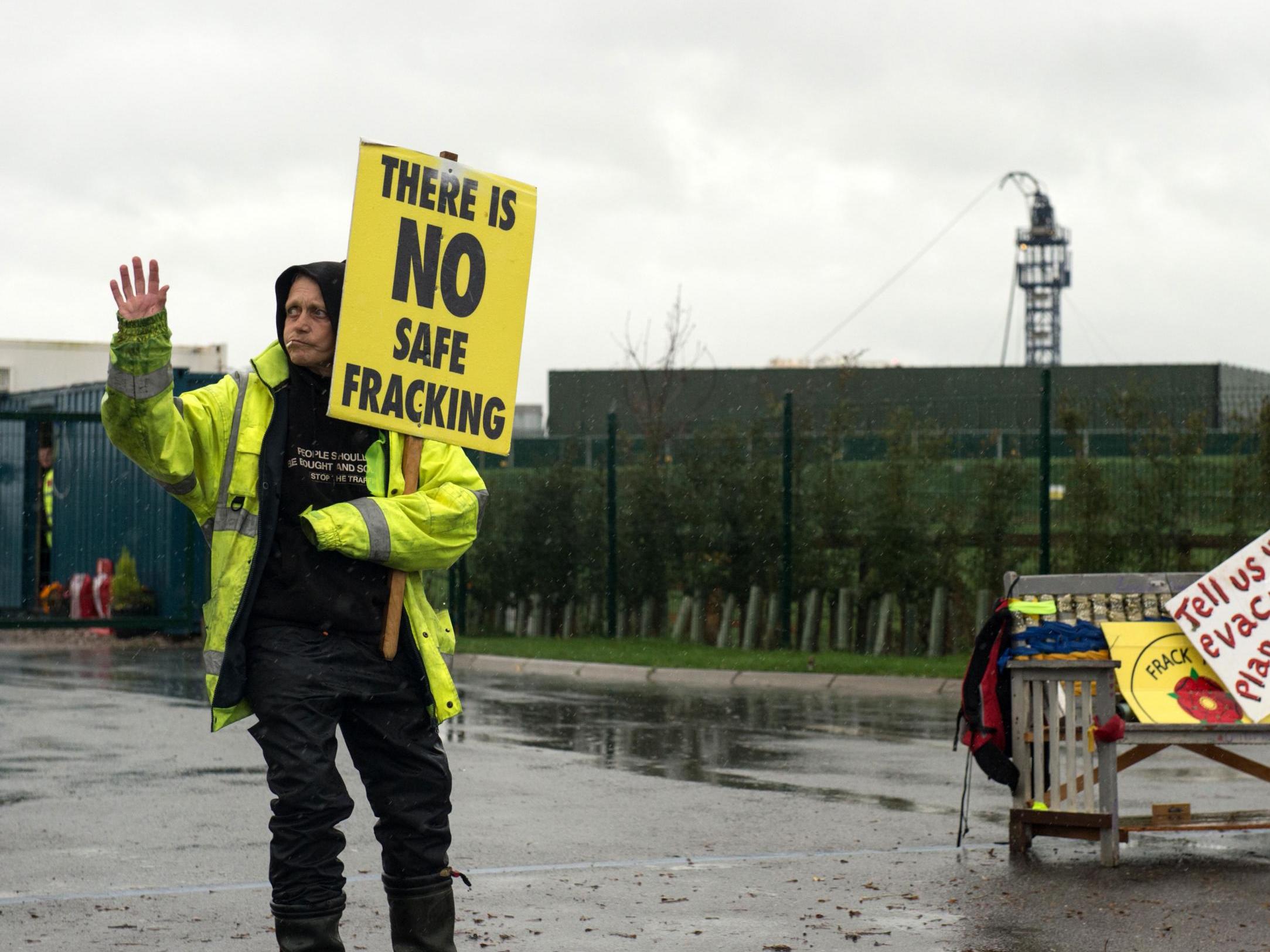Surge in oil and gas companies using injunctions to block protesters at UK sites
Local activists face fines and imprisonment if they breach ‘vague, unclear and confusing’ rules at fossil-fuel drilling locations

Fracking and fossil-fuel companies are taking out “draconian” injunctions to block protesters at drilling sites linked with earthquakes and other environmental damage.
The legal action is being used to scare off local residents both from protesting at the sites and joining opposition groups online, lawyers told The Independent.
Since the end of 2017 oil and gas firms have taken out five injunctions covering 16 sites from Lancashire to Surrey in a bid to curb protesting.
Critics say this represents a new trend of companies taking excessive measures to drive away peaceful activists.
Anyone caught flouting the injunctions faces fines, seizure of assets and imprisonment.
The companies say they are interested only in discouraging unlawful behaviour, but local residents say uncertainty about the extent of the rules has caused the number of protesters to slump.
Because the injunctions are written in legal jargon and not directed at specific individuals, there is confusion about what constitutes a breach.
“Even if you get access to the information, the evidence for many campaigners is that the injunctions are so vague, unclear and confusing that you people just don’t know whether their activities will be breaching it,” said Stephanie Harrison QC, a lawyer involved in challenges against these injunctions.
She said people could be breaking the rules without realising it, for example by belonging to WhatsApp and Facebook groups organising or supporting anti-fracking campaigns.
Opposition to fossil-fuel extraction is a cause that has united both hardened eco-warriors and local residents under one banner, and campaigners see the injunctions as an attempt to “divide and rule”.
They fear decisions about public order are being taken away from the police and their well-defined approach to protest, and placed in the hands of industry, corporate lawyers and private security firms.
Injunctions issued by the High Court are not handled by conventional law enforcement, but those breaching them can be held in contempt of court and handed severe sentences.
Six anti-fracking activists in Lancashire are currently facing legal action after breaking an injunction in July in a “deliberate attempt” to highlight the perceived infringement on their right to protest. Their case has not come to court yet.
Dave Timms, head of political affairs at Friends of the Earth, decried the “sinister new strategy” as a response to widespread community opposition to drilling.
“We believe that these injunctions are wrong in principle and in law,” he said.
“We are now looking to the Court of Appeal to uphold our long-established rights to freedom of expression and assembly, which are under serious threat here.”
Local residents were horrified by the threats of legal action, and said they had a marked effect on the number of people turning up to protests.
Barbara Richardson, a protester at Cuadrilla’s Preston New Road fracking site in Lancashire, said this was especially evident among “ordinary people” who, like her, had not been involved in protesting before.
“We have tea and cakes and things like that – it’s a very good atmosphere, and it’s almost like the injunction is deliberately trying to stop that,” she said.
She said in the immediate aftermath of the injunction, the prospect of a prison sentence was enough to frighten away many of those who had been protesting regularly.
Jacqui Hamlin was arrested at a “slow walk” protest while bringing water to protesters at Angus Energy’s Brockham site in Surrey, prior to an injunction being issued.

She was subsequently inspired to challenge UK Oil & Gas plc’s (Ukog) injunction at Horse Hill, another Surrey site, and said she had assumed injunctions were the preserve of wealthy footballers.
“It didn’t seem to me like proper law because proper law has to go through parliament and be debated. This is just draconian, sweeping and immediate,” she said.
Other sites covered by the injunctions, taken out by some of the country’s biggest fossil-fuel exploration firms, include areas in Nottinghamshire, Cheshire and Yorkshire, as well as the London offices out of which some of them operate.
Ukog declined to comment, but Cuadrilla said its injunction would have no impact on legal protest and Preston New Road had seen an “extraordinarily high level of unlawful protest activity”.
“Illegal protest, peaceful or not, should not be allowed to prevent law-abiding workers doing their daily job. The right to work is as important as the right to protest,” it said.
Join our commenting forum
Join thought-provoking conversations, follow other Independent readers and see their replies
Comments
Bookmark popover
Removed from bookmarks